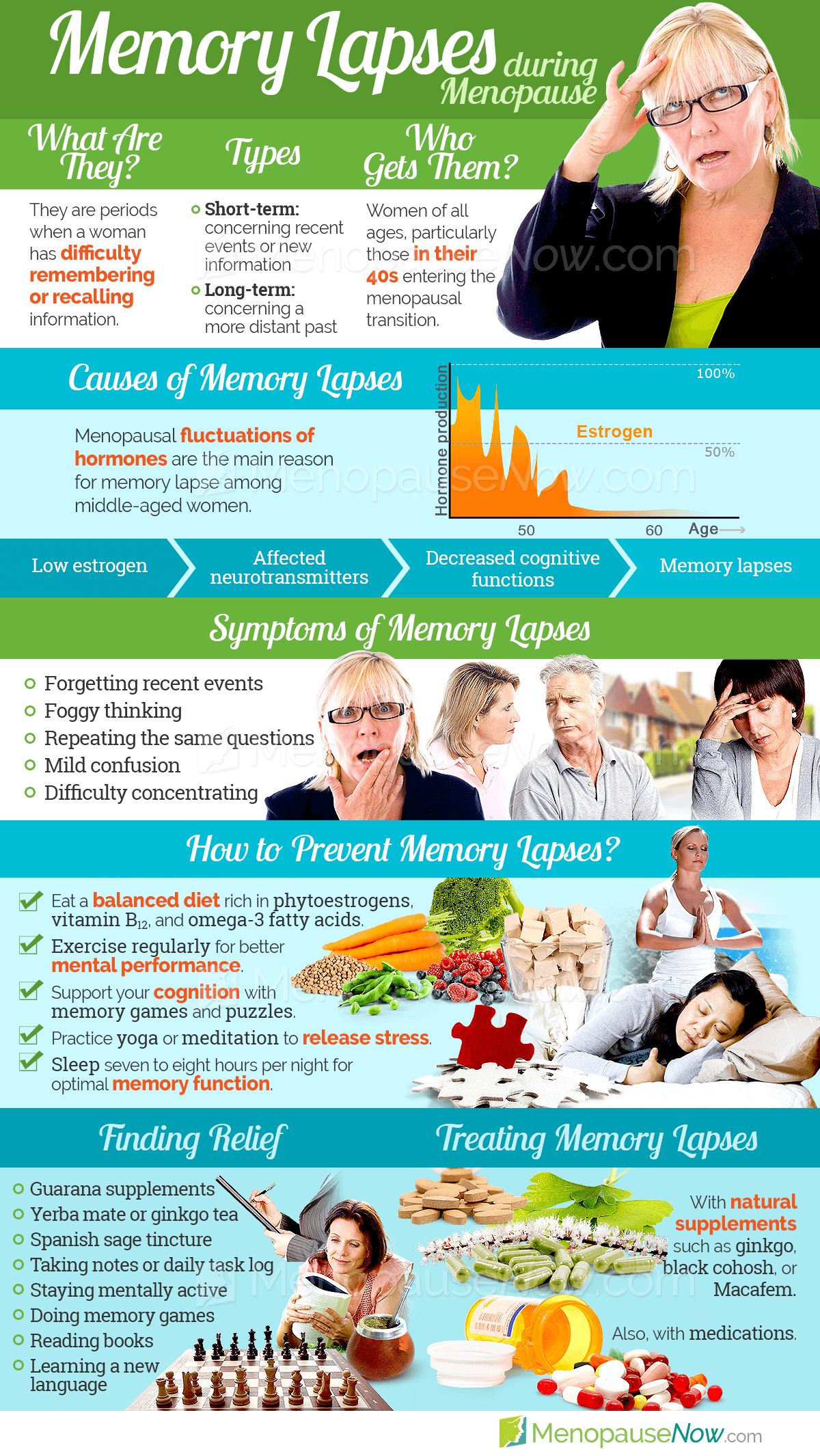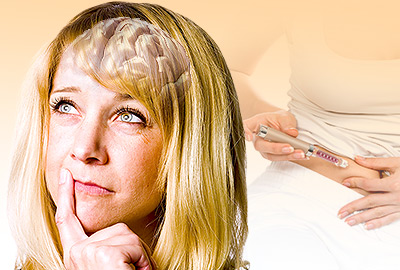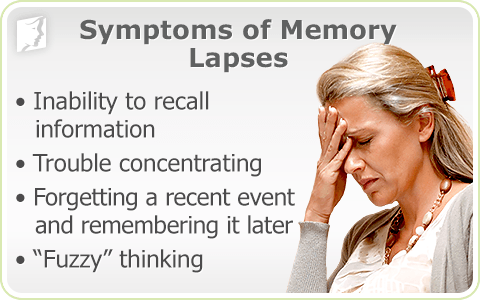
For many women going through menopause, memory lapses can be one of the most unsettling symptoms. This can lead to many misconceptions, such as the belief memory lapses are indicative of a more serious issue. Memory lapses, however, are typically due to hormone fluctuations that occur during menopause and are rarely a cause for concern. Learn more about what memory lapses are, what causes them, and the treatment options available.
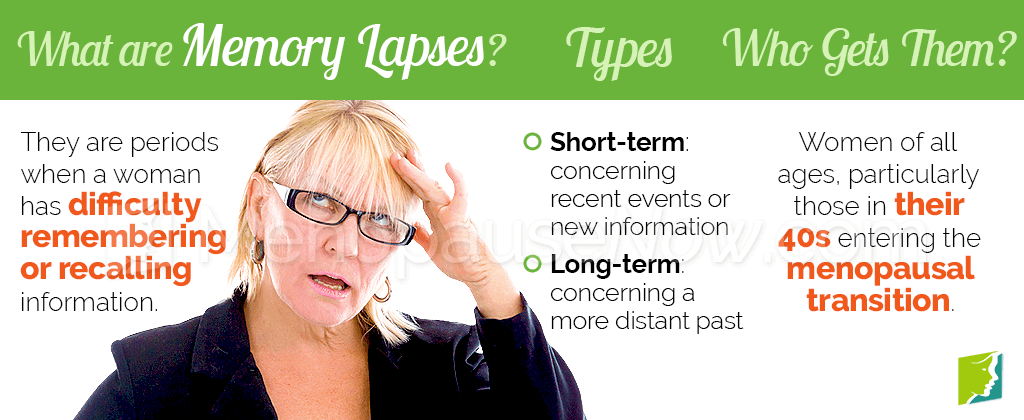
About Memory Lapses
Definition
Memory is defined as the mental capacity or faculty of retaining or recalling facts, events, impressions, or previous experiences. Memory lapses, then, are fleeting periods when a person loses the mental capacity or faculty of retaining or recalling information.
Two types of memory are affected in women who experience memory lapses: short-term memory and recent memory.
Women who suffer from memory lapses typically report that they have "brain fog" when trying to remember where they left their reading glasses, for example. Recollections of names, dates, and addresses can also elude a woman experiencing memory lapses during menopause, especially when she just received that information.
Types of memory
Memory is often simplified into only two categories: short- and long-term memory. In fact, there are several types that comprise the extremely complex function of memory. The different types of memory shown below will give a better idea of the different functions memory serves.
Short-term memory
The ability to remember information for brief moments, such as a telephone number for the time it takes to dial it.
Recent memory
The ability to recall day-to-day events, involved in learning new information.
Sensory memory
The ability to recognize smells, sounds, and sights.
Long-term memory
Also known as remote memory, long-term memory deals with the more distant past.
Declarative memory
The ability to remember the meaning of words, facts, and a generalized knowledge of the world.
Procedural memory
The ability to remember motor skills - knowing how to do things - such as how to walk, ride a bike, and eat.
Symptoms of memory lapses

The primary symptom of memory lapses is the inability to recall information at will, but there are other secondary symptoms of memory lapses as well.
- Trouble concentrating
- Forgetting a recent event and remembering it later
- "Fuzzy" thinking
Once a woman is able to recognize that she is having memory lapses, it can be extremely useful to learn about how and why they happen.
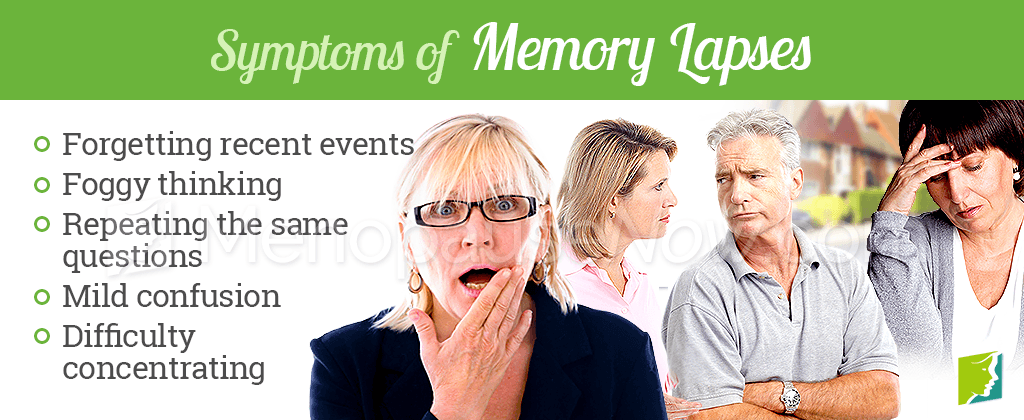
Click on the following link to learn more about memory lapses, or continue reading on to learn more about the various causes of this symptom.
Causes of Memory Lapses
Several factors can be the reason behind memory lapses in menopausal women.
Hormonal Causes
Like many other menopause symptoms, memory lapses are caused largely by hormonal imbalance. Memory lapses can also be a compound of other menopause symptoms that affect a woman's concentration level and mental retention.
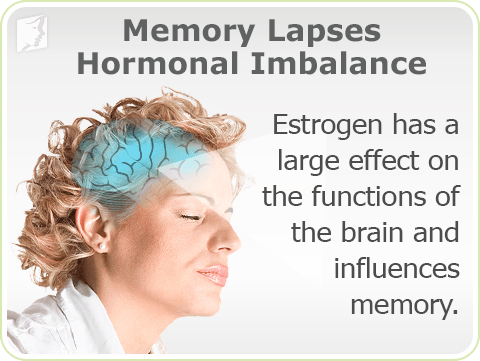
Memory lapses are a common occurrence for women experiencing perimenopause. As a woman approaches menopause, levels of certain hormones in the body decrease. These diminishing levels, particularly of estrogen, have myriad effects on a woman's body and mind.
In the case of memory lapses, estrogen plays a special key role. It has a large effect on the functions of the brain and influences language skills, mood, attention, and a number of other functions, including memory. Estrogen is directly linked to verbal word fluency, or the ability to remember names and words. It's no wonder, then, that as a woman's estrogen levels begin to drop, her memory may suffer.
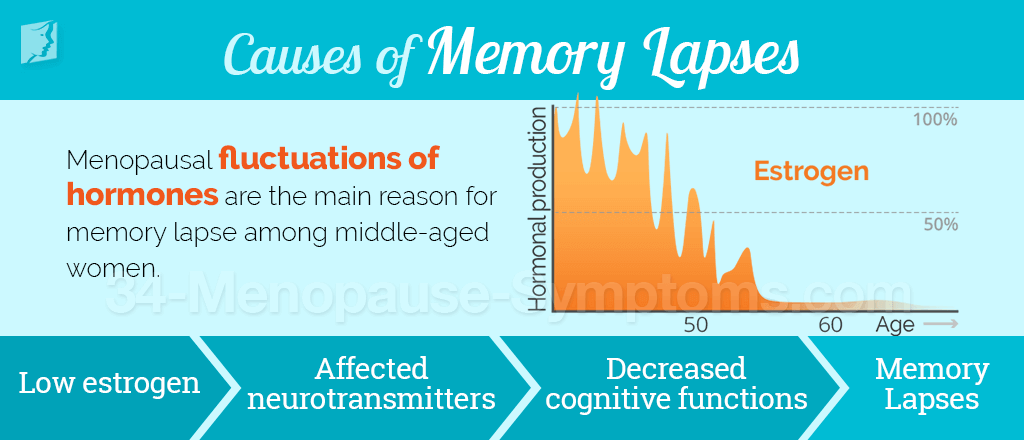
Risk factors
Although hormone fluctuations are the most common cause of memory lapses in menopausal women, other risk factors can trigger this symptom as well, including:
- Excessive amounts of alcohol
- Some medications (e.g., sleeping pills, antidepressants, blood pressure and heart medications, painkillers, tranquilizers)
- Vitamin deficiencies
- Poor diet
- Lack of sleep
- Excessive workload
When to see a doctor
If a woman is experiencing severe memory lapses, where she finds it difficult to recall information she has known for years and routinely used, she should consult a doctor to be checked for the following disorders associated with memory lapses:
- Alzheimer's disease
- Infections of the brain, such as encephalitis or meningitis
- Head trauma
- Stroke
- Multi-infarct dementia
- Cancer
- Attention deficit disorder (ADD)
Fortunately, at whatever level a woman is experiencing memory lapses, there are solutions.
Click on the following link to learn more about the causes of memory lapses during menopause, or continue reading below to learn more about the treatment options.
Memory Lapses Treatments
Fortunately, most of the time, memory lapses are not a condition that a woman must live with permanently; treatments are available. It is recommended to begin with the least invasive method and progress up to more drastic treatments if the symptom remains unaffected.
Lifestyle changes
Modifications in habit can be implemented into a woman's life, such as dietary adjustments or a different exercise program. A balanced diet including additions such as omega-3 fatty acids can help a woman to concentrate.
In addition, a wide variety of fresh fruit and vegetables is important in order to obtain memory-boosting antioxidants and the vitamins B, C, D and E, all of which are important for proper mental function. Mental exercises and games, such as crossword puzzles and Sudoku, have been shown to improve memory. Exercise and proper sleep also go a long way in helping with memory.
Alternative medicine
As the primary cause of memory lapses in menopausal women is a decrease in estrogen levels, generally the best way to manage this symptom is to address the fundamental hormonal imbalance. Natural supplements can be a safe and effective treatment option.

Pharmaceutical
There is a third option if the recommended combination of lifestyle changes and natural remedies is not effective enough. Pharmaceutical options to treat memory lapses exist, though these carry a higher risk of side effects. If memory lapses are so severe that a woman is considering these options, she should consult a trusted medical professional to better understand the potential benefits and risks involved.
Click on the following link to learn more specifics about the treatments for memory lapses, which begin with lifestyle changes, move onto alternative medicines, and finally, if those options do not work, medications.
Sources
- Colcombe, S.J. et al. (2006). Aerobic exercise training increases brain volume in aging humans. The journals of gerontology, 61(11), 1166-1170. Retrieved from http://www.ncbi.nlm.nih.gov/pubmed/17167157
- Food and Drug Administration. (2010). Coping with Memory loss. Retrieved April 20, 2016, from http://www.fda.gov/forconsumers/consumerupdates/ucm107783.htm
- Henderson, V.W. (2008). Cognitive Changes after Menopause: Influence of Estrogen. Clinical Obstetrics and Gynecology, 51(3), 614-626. doi: 10.1097/GRF.0b013e318180ba10
- Greendale, G.A. , Derby, C.A. & Maki, P.M. (2012). Perimenopause and Cognition. Obstetrics and gynecology clinics of North America, 38(3), 519-535. doi: 10.1016/j.ogc.2011.05.007
- Kulzow, N. et al. (2016). Impact of Omega-3 Fatty Acid Supplementation on Memory Functions in Healthy Older Adults. Journal of Alzheimer's Disease, 51(3), 713-725. doi: 10.3233/JAD-150886
- Uchida, S. & Kawashima, R. (2008). Reading and solving mental arithmetic problems improves cognitive functions of normal aged people: a randomized controlled study. Age, 30(1), 21-29. doi: 10.1007/s11357-007-9044-x

